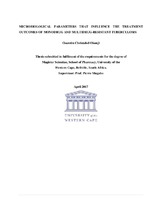| dc.contributor.advisor | Mugabo, Pierre | |
| dc.contributor.author | Okonji, Osaretin Christabel | |
| dc.date.accessioned | 2018-08-01T08:43:30Z | |
| dc.date.available | 2018-08-31T22:10:06Z | |
| dc.date.issued | 2017 | |
| dc.identifier.uri | http://hdl.handle.net/11394/6148 | |
| dc.description | Magister Pharmaceuticae - Mpharm | |
| dc.description.abstract | Previous studies have reported microbiological parameters such as HIV infection, resistance to
anti-TB drugs such as fluoroquinolones, resistance to previous treatment with anti-TB drugsand
extrapulmonary TB, causing poor treatment outcomes in patients with monodrug and multidrugresistant
tuberculosis. However, little is known about the time to sputum culture conversion in
HIV-positive patients infected with monodrug and multidrug-resistant tuberculosis in South
Africa, and currently there is no information on the effects of inappropriate (i.e. low and high)
anti-tuberculosis drug-dose on the time to sputum culture conversion in monodrug and
multidrug-resistant TB patients. The aim of the study was to investigate whether or not there is a
difference between the time to sputum culture conversion in drug-resistant tuberculosis patients
with HIV, and those without HIV infection. It also aimed to find out whether inappropriate (i.e.
low and high) anti-tuberculosis drug dose could affect the time to sputum culture conversion in
drug-resistant TB patients. In addition, the influence of HIV infection (CD4 count and viral
load), drug resistance type, impact of antiretroviral duration before TB treatment, the
replacement of ofloxacin by moxifloxacin and DR-TB localization were assessed on drugresistant
TB treatment outcomes. | |
| dc.language.iso | en | |
| dc.publisher | University of the Western Cape | |
| dc.title | Microbiological parameters that influence the treatment outcomes of monodrug and multidrug-resistant tuberculosis | |
| dc.rights.holder | University of the Western Cape | |

